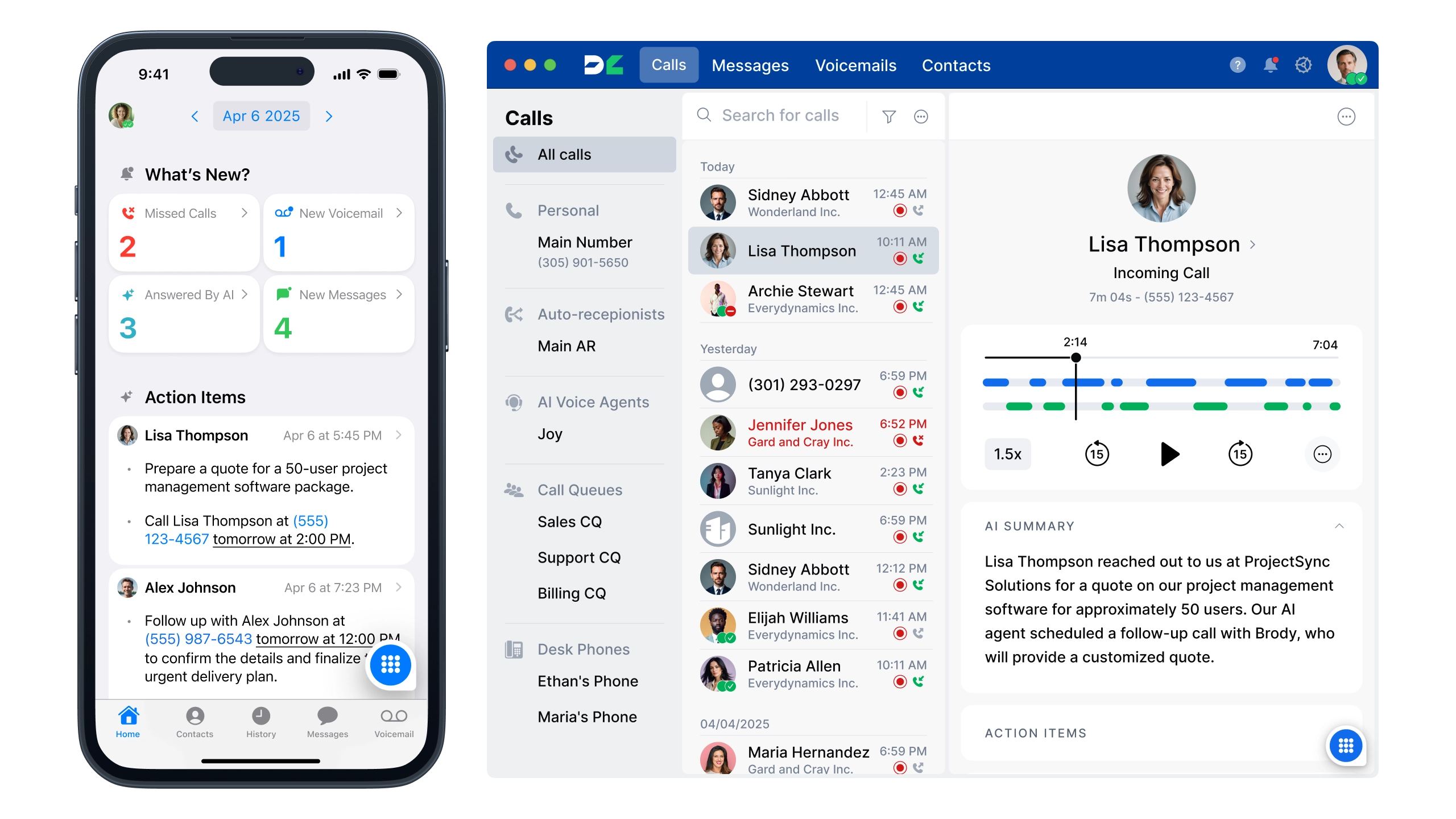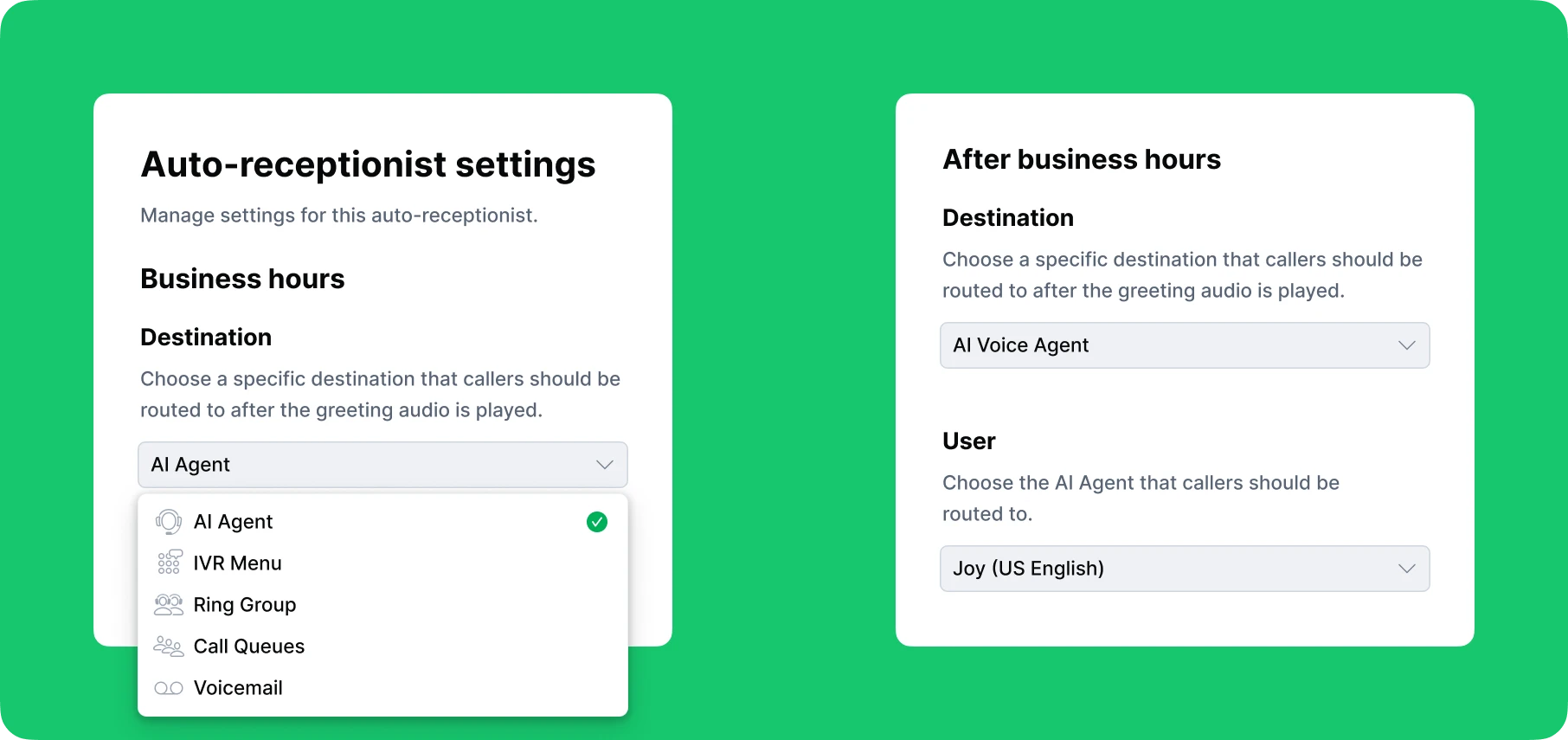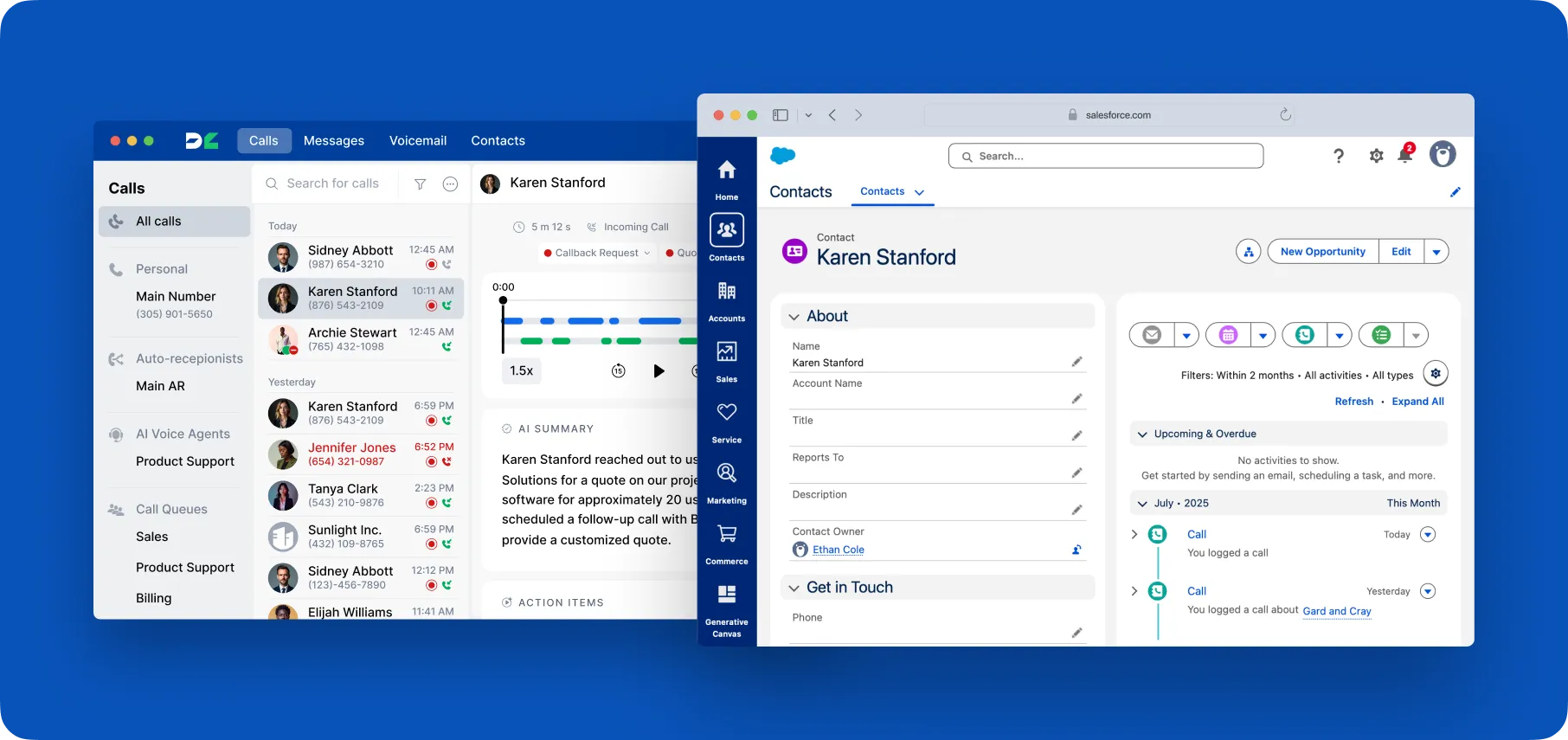Blog
Cloud Phone System
What are Cloud Communications for Small Businesses?

What are Cloud Communications for Small Businesses?
Discover what cloud communications are, the channels they include, the different types of platforms available, and their key benefits for businesses.
Modern business communication is under constant pressure. Teams need to stay connected across multiple devices and channels: phone calls, messages, video, and email. With so many tools and accounts, conversations often become fragmented, making it harder to deliver a seamless experience. Cloud communications solve this challenge.
Cloud communications transform the way businesses handle phone calls, messaging, and video. Instead of relying on traditional phone lines or bulky on-site PBX hardware, everything runs over the internet. This means your business’s voice and data communication needs are managed through scalable, internet-based services.
In this article, we’ll explore what cloud communications are, the channels they include, the different types of platforms available, and their key benefits for businesses.
What is Cloud Communication?
Cloud communications refer to internet-based voice and data communications where the applications, storage, and switching are hosted by a third-party provider on cloud infrastructure. In simple terms, it means your phone calls, video conferences, instant messages, and other communication services run through remote cloud servers rather than on-premises equipment. These services are delivered “as a service” by cloud communication providers, so businesses access them over the public internet on a subscription or usage basis.
Formats of Cloud Communications
Cloud business communications can take several forms, each supporting different aspects of how teams and customers connect:
- Team messaging and chat: Real-time chat tools let employees collaborate instantly, share files, and keep discussions organized by project or topic.
- Video conferencing: High-quality video and screen-sharing features support virtual meetings, training sessions, and customer presentations.
- Phone calls: Internet-based calling replaces traditional phone systems, enabling businesses to make and receive calls from anywhere.
- Text messaging (SMS/MMS/RCS): Businesses can send updates, reminders, or promotions directly to customers’ mobile devices, creating a fast and reliable communication channel.
- Email: Still a cornerstone of professional communication, email hosted in the cloud ensures accessibility and easy integration with other business tools.
These formats may exist as separate applications, but many businesses are adopting unified platforms that bring them all together. By centralizing communication into one system, companies gain a more convenient, efficient, and cost-effective way to manage conversations across devices and channels
What is Cloud Communication Platform?
A cloud communication platform is an umbrella category that includes different types of cloud-based communication services and solutions. Let’s explore the key types of cloud communication services and solutions.
Key Cloud Communications Service and Solutions
Cloud Phone Systems and VoIP Phone Systems As the name suggests, cloud phone systems focus on managing phone calls through the internet rather than traditional phone lines. They rely on VoIP (Voice over Internet Protocol) technology, which enables users to make and receive calls from any device with an internet connection. In most cases, all that’s required is downloading an app to a computer or mobile device to start using the system.
While the terms cloud phone system and VoIP phone system are often used interchangeably, there is a key distinction. VoIP systems can also be deployed on-premises, requiring local servers and maintenance. A cloud phone system, on the other hand, is hosted entirely online, removing the need for in-house infrastructure and offering greater scalability and cost efficiency.
Cloud Messaging and Collaboration Tools Beyond voice, cloud communication also includes messaging platforms for internal collaboration. These tools support real-time chat, file sharing, and video meetings, enabling teams to work seamlessly across locations and devices.
Unified Communications as a Service (UCaaS) If your business leverages multiple communication channels for internal collaboration, a cloud-based UCaaS solution (often referred to as cloud unified communications or unified communications in the cloud**)** can combine VoIP calling with video, chat, and other tools in a single unified communications cloud environment. Instead of juggling separate apps, businesses benefit from a unified system that streamlines collaboration, reduces IT overhead, and improves productivity.
Contact Center as a Service (CCaaS) While UCaaS focuses on internal collaboration, CCaaS solutions are designed to manage customer interactions across multiple channels, including voice, chats, SMS, and social media.
Because they are built for contact centers, these cloud-based platforms provide all the tools agents need to deliver effective customer service, such as intelligent call routing, voicemail, call recording, and even AI-powered features like transcription.
Top Benefits of Cloud Communications Platforms for Small Businesses
Each type of cloud communication solution offers its own benefits, which may be more relevant in some cases and less in others. However, there are several general advantages of a cloud communications platform that businesses can consistently count on:
Cost-Effectiveness
By eliminating the need for on-premises hardware and expensive maintenance, cloud platforms significantly reduce upfront costs. Businesses typically pay a predictable monthly subscription, making budgeting easier and lowers the total cost of ownership.
Scalability and Flexibility
Every business aims to grow, but it’s difficult to predict how many phone lines, users, or accounts you’ll need in the future. Cloud communication solutions are designed to be flexible; they can scale up or down as your requirements change. With a cloud communication platform, you don’t have to worry about limitations on future growth, since the system adapts seamlessly during periods of expansion or contraction.
Simplified Management
Most cloud communication platforms are designed for simplicity and can be managed through a centralized, user-friendly dashboard. Even if you’re a small business owner without dedicated IT staff, you can configure settings, add users, and monitor usage without requiring specialized expertise.
Mobility & Remote Work Support
Employees can access voice, video, and messaging tools from any device with an internet connection. Whether working in the office, at home, or on the go, teams stay connected and productive.
Access to a Rich Set of Features
One of the biggest advantages of cloud communication solutions is instant access to advanced features without the cost or complexity of managing them in-house. Modern providers continually enhance their platforms with tools for call management, business messaging, and video conferencing, while also adopting innovations in AI and real-time analytics.
As your business grows, you can easily upgrade within the same platform and immediately start using new features across your existing infrastructure — no lengthy setup or additional hardware required.
Integration with Other Business Applications
Cloud communication platforms often integrate seamlessly with core business tools such as CRMs, help desk software, and productivity apps. These integrations enable businesses to automate workflows, capture customer interactions directly within their systems, and create a smoother, more connected experience for both teams and customers.
Reliability and Business Continuity
Because services are hosted in the cloud with built-in redundancies, businesses gain higher reliability compared to traditional phone systems. Even during outages or disruptions, teams can reroute calls and maintain customer communications.
How Do Businesses Use Cloud Communications Platforms?
Cloud communication platforms support organizations of all sizes and industries, from startups to global enterprises. They provide reliable voice, video, and messaging tools that power customer service, sales, remote work, and team collaboration. Industries such as healthcare, retail, and finance rely on these platforms to deliver secure, scalable, and modern communication experiences.
Small Businesses and Startups
Even as a small business or startup, you can access enterprise-grade communication features without a large upfront investment. By paying predictable monthly fees based on the number of users, phone numbers, and features, you get immediate access to the same tools larger companies use.
This enables smaller teams to operate professionally and efficiently while keeping overhead costs low.
Hybrid and Remote Working
With workforces now spread across offices, homes, and even time zones, cloud communication tools ensure employees stay connected wherever they are. Calls, video meetings, and team chats can be joined from any internet-connected device like mobile phone, tablet, or laptop, reducing dependency on location-based infrastructure.

Call Centers and Customer Service
Cloud communication platforms like Contact Center as a Service (CCaaS) equip call centers with advanced tools such as smart call management, Interactive Voice Response (IVR) menus, call queues, and real-time analytics. These features enable support teams to handle customer interactions more efficiently, monitor performance in detail, and deliver consistent, reliable service across every channel.

Modern communication platforms like DialLink offer built-in AI voice agents that can act as independent call center assistants. They handle routine incoming calls, route them to the right team, and warm transfer more complex issues to a human agent.
With MCP integration, these AI agents can also connect to your business tools, retrieve data to provide more informed responses, and perform various actions on your behalf.

Sales and Lead Generation
Sales teams benefit from cloud communication platforms through integrations with CRMs and sales tools. Every call, text, or video interaction can be automatically logged into the CRM, ensuring no lead slips through the cracks and giving managers full visibility into the pipeline.
Most cloud communication platforms also provide click-to-call functionality, allowing reps to dial prospects directly from the CRM or browser with a single click—saving time and reducing errors. For higher-volume outreach, power dialers help automate call sequences, enabling sales teams to connect with more leads in less time. Combined with analytics and AI-driven insights, these features make it easier to track performance, refine strategies, and close deals faster.

Internal Business Collaboration
For day-to-day operations, cloud platforms provide a central hub for teamwork. Real-time chat replaces long email chains, file sharing ensures version control, and video conferencing makes meetings more engaging. Integration with project management tools further streamlines workflows, keeping teams aligned, reducing silos, and accelerating decision-making.
How to Choose a Cloud Communications Service?
With so many providers and features available, selecting the right cloud communications service requires careful planning. Here are the key steps to guide your decision:
1) Identify your business needs: Start by clarifying what you want to achieve. Do you need a solution focused on internal collaboration, such as team messaging, video conferencing, and file sharing, or are you also looking for customer-facing tools like contact center capabilities, call routing, or SMS campaigns? Consider which channels (voice, video, chat, SMS, email, or social media) are most critical for your business.
Understanding your needs helps you stay focused on the right cloud communications solutions.
2) Evaluate cloud communications providers: Once you know what type of cloud communication platform you need, start comparing providers based on how their offerings stack up against your checklist of must-haves. Don’t just look at features, pricing models, reliability, security, and uptime guarantees are equally critical.
It’s also important to evaluate integration capabilities. The ideal solution should sync seamlessly with the apps and tools your teams use every day, ensuring smooth workflows and minimal disruption.
3) Take advantage of free trials: Most providers offer a trial period. Use it to test call quality, ease of use, and compatibility with your team’s devices and workflows. This hands-on experience will reveal whether the platform truly fits your needs.
4) Evaluate pricing plans: Pricing models can vary significantly. Some charge per user, others per feature set, and many offer bundled plans. Make sure the plan you choose balances affordability with access to the features you’ll actually use.
5) Plan for future growth: Your needs today may not be the same in a year. Choose a service that scales easily: adding users, numbers, or advanced features without requiring major changes. A flexible platform ensures your communication system grows alongside your business.
Conclusion: Move Your Business Communications to the Cloud
Cloud communications have become a backbone for modern businesses, keeping teams connected no matter where they’re located. By unifying multiple communication channels — voice, video, messaging, and team collaboration — these platforms help organizations stay agile, efficient, and productive.
Choosing the right solution takes careful consideration, as it directly shapes how your team communicates, collaborates, and grows.
If you’re ready for a business phone system that goes beyond calls, offering business messaging, advanced call management, AI automation, and seamless integrations, try DialLink. Take it for a spin with a free trial and see how easy it is to transform your business communications.
The main advantages of cloud communications are that they are cost-effective, easy to launch, and simple to manage. They help reduce costs and make it easy to scale as your business grows. Cloud platforms also support mobility and flexible growth, enabling employees to stay connected and productive from anywhere.
A common example is a cloud phone system that lets employees make and receive calls from their laptops or mobile devices. Other examples include video conferencing apps, team messaging platforms, and cloud-based contact centers.
Yes. Most providers use encryption, multi-factor authentication, and compliance certifications to keep communications secure. It’s important to choose a provider with strong data protection standards and reliable uptime guarantees.
Yes. Most providers offer number porting, which lets you transfer your existing business phone numbers to the new cloud system without disruptions. This ensures your customers can keep reaching you on the same numbers while you upgrade your communication infrastructure.
Pricing usually depends on the number of users and the features included. Many providers offer per-user monthly plans, starting from as little as $15–$30 per user, with more advanced plans available for contact centers or businesses with higher feature requirements.
Yes. Most modern platforms integrate with popular business applications like Salesforce, HubSpot, Zendesk, and Microsoft 365. These integrations let you log calls automatically, sync contacts, and create automated workflows that save time and improve customer experience.
Featured Tags
Share
In this article

Arina Khoziainova
Content Writer at DialLink
Arina is a content writer with over 7 years of experience in the IT industry. At DialLink, she creates clear, insightful content that helps small business and startup owners simplify communication and drive growth using modern tools. With a strong focus on practical value, Arina transforms complex topics into accessible, actionable stories.
Keep Reading

Google Voice Auto Attendant: What It Is and How It Works
Explore how Google Voice auto attendant works and whether it’s right for your small business.

Understanding Inbound Calls and How to Handle Them
Learn what inbound calls are, why they matter, and how to handle them efficiently.

Warm Transfer: What It Means and When to Use It
Learn what a warm transfer is, how it works, how it differs from a cold transfer.

Cold Transfer Explained: When to Use and When to Avoid It
Read what cold transfer is, how it differs from a warm transfer, and when it should be used.

Understanding Call Management: How It Works and Why It Matters
Learn what call management is, discover its key components, and find out whether your business needs one.

What is Business Text Messaging?
Discover what business text messaging is, the channels available, and how companies use it to connect with customers more effectively.

Hosted VoIP Explained: The Non-Technical Guide for Businesses
Explore what hosted VoIP is, how it works, and why more businesses are switching to hosted VoIP systems.

What Is a VoIP Phone System?
Read about what a VoIP phone system is, how it outperforms traditional setups, and the main ways it’s used in everyday communication.